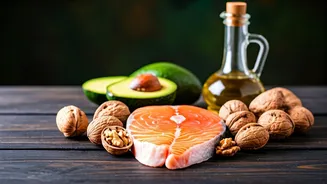HDL Cholesterol Explained
First, it's important to understand HDL cholesterol. It's your body's cleanup crew for cholesterol. HDL, or high-density lipoprotein, grabs excess cholesterol from
your arteries and transports it to the liver, where it's eliminated. High levels of HDL are associated with a lower risk of heart disease. This is in contrast to LDL (low-density lipoprotein), often termed "bad" cholesterol, which contributes to plaque buildup in arteries. Maintaining a good balance of these cholesterol types is vital for cardiovascular health. By understanding the role of HDL, you can make informed dietary choices to support your heart health.
Olive Oil's Heart Benefits
Next on the list is olive oil, a staple of the Mediterranean diet. Rich in monounsaturated fats, olive oil is known for its heart-healthy properties. These fats help to increase HDL cholesterol levels. It also contains antioxidants that combat inflammation. Olive oil is versatile and can be used in cooking, drizzled over salads, or as a finishing touch to various dishes. Regular consumption of olive oil, especially extra virgin olive oil, can significantly contribute to improved heart health by supporting healthy cholesterol levels and reducing inflammation in the arteries. Be sure to use olive oil in moderation, as it is calorie-dense.
Avocados and Your Heart
Avocados, with their creamy texture and rich flavor, are another excellent addition to a heart-healthy diet. They are packed with monounsaturated fats, similar to olive oil, which help raise HDL cholesterol. Additionally, avocados are a good source of fiber, which aids in lowering LDL cholesterol. Fiber also contributes to overall digestive health. Incorporating avocados into your diet can be as simple as adding them to salads, smoothies, or even enjoying them as a spread on toast. The healthy fats and fiber in avocados not only boost HDL but also help keep you feeling full and satisfied, making it a beneficial choice for overall well-being.
Fatty Fish for HDL Boost
Fatty fish like salmon, mackerel, and sardines are beneficial. These fish are rich in omega-3 fatty acids. Omega-3s are known for their anti-inflammatory effects. They help to reduce triglycerides, another type of fat in the blood, while also boosting HDL cholesterol. Consuming fatty fish twice a week can provide significant heart health benefits. These fish can be grilled, baked, or pan-fried. They are also a good source of lean protein and other essential nutrients. Choosing sustainably sourced fish ensures that you are also contributing to the well-being of our oceans, in addition to your heart health.
Nuts: Tiny Powerhouses
Nuts, particularly almonds, walnuts, and pecans, are a convenient and nutritious snack that supports heart health. Nuts are loaded with healthy fats and antioxidants. These nutrients assist in increasing HDL cholesterol and reducing LDL cholesterol levels. However, nuts are calorie-dense, so it's important to consume them in moderation, typically about a handful per day. They make a great addition to salads, yogurt, or can be enjoyed on their own as a snack. The combination of healthy fats, fiber, and antioxidants in nuts makes them an excellent choice for those aiming to improve their cardiovascular health.
Whole Grains' Advantage
Whole grains such as oats, brown rice, and quinoa can also play a role in improving HDL cholesterol. They are high in soluble fiber, which can help lower LDL cholesterol levels, creating a more favorable cholesterol profile. Fiber also promotes digestive health. Whole grains provide sustained energy throughout the day, keeping you feeling full and satisfied. Incorporating whole grains into your diet involves replacing processed grains with options like whole-wheat bread, brown rice, or oatmeal. Choosing whole grains is a simple but effective way to support both your heart health and overall well-being.
Berries: Antioxidant Boost
Finally, berries are a delicious and nutritious addition to your heart-healthy diet. Berries like blueberries, strawberries, and raspberries are rich in antioxidants and fiber. Antioxidants help to protect your arteries from damage, while the fiber contributes to lower LDL cholesterol. Berries are also low in calories and can be enjoyed in various ways, from smoothies and salads to desserts. Adding berries to your diet is a sweet and healthy way to boost HDL cholesterol levels and improve your cardiovascular health. Their natural sweetness and versatility make them a great addition to any meal.
















